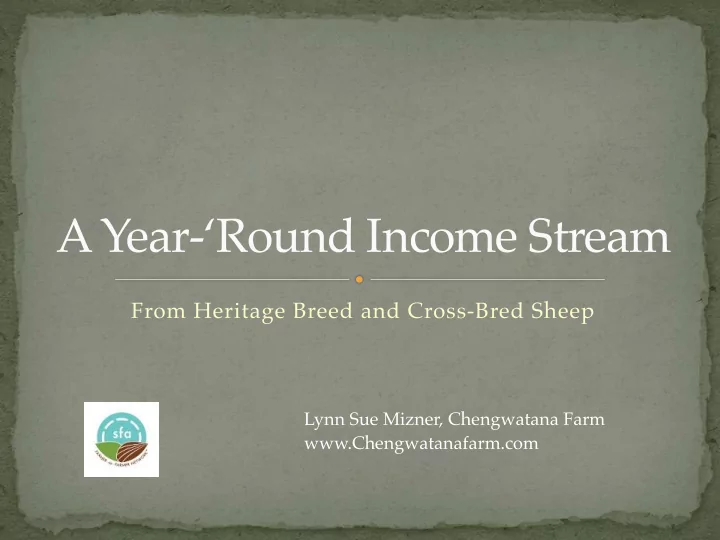

A Year-‘Round Income Stream From Heritage Breed and Cross-Bred Sheep Lynn Sue Mizner, Chengwatana Farm www.Chengwatanafarm.com
Chengwatana Farm, Palisade MN
Black Welsh Mountain Sheep
Many Farm Expenses are Regular ● Feed ● Utilities ● Fuel ● Insurance ● Mortgage ● Equipment payments ● Wages for labor Whereas a lot of farm income is seasonal
In addition, farmers often buy retail and sell wholesale. ● Buy Supplies Retail ● Buy Feed Retail ● Sell lambs wholesale ● Sell wool wholesale
I’ve been working to address two issues: ● Producing an income that is more evenly distributed throughout the year; and ● Adding value to my farm products so that they command a price that makes it all worthwhile.
What Does Adding Value Mean? ● Add your labor to increase the value ● Differentiate your product ● Have product when others do not ● Convince people they need your product ● Reducing the cost of inputs to your farm
How Much Value Can We Add? ● Raw wool $1-5/lb ● Rare breed fleeces $15-18/lb ● Spun yarn $50-$100/lb ● Finished lambs at stockyard $2/lb ● Finished lamb direct sale $9-$14/lb ● Add knitting or crocheting and you are up to $140/lb
What does it mean to differentiate one’s product? ● Have a different process that people are willing to pay for: ● Organically or naturally produced ● Rare or heritage breed/breeds in need of conservation ● Locally grown ● Humanely raised/slaughtered ● Free from artificial dyes or scouring chemicals ● Fair wages, and so on.
Having product when others do not ● Earlier or later availability of product ● Plan to have a product during slow market weeks/ months to increase the time you have to contact potential customers ● Have a different product available when others are not thinking of selling ● Vend at shows or conferences where no one is selling similar product ● This may involve storage or other costs, but will benefit you by giving you increased exposure.
Helping people understand WHY they need your product ● This is marketing, but to be really successful it has to go on ALL the time ● Focus on the “WHY” ● Why you do what you do ● Why you produce what you do ● Why your product is different ● Help your customers feel like they are part of the answer to the “WHY” questions; they will want to support you.
Spread Income ● Spring value-added wool sales ● Spring composted manure sales ● Summer managed intensive rotational grazing ● Farmers market sale of tanned hides, yarn ● Fall breeding stock sales ● Fall Fiber sales – raw fleece, roving, spinning batts, quilt batts, comforters ● Fall and early winter lamb harvest ● Fall and winter farm to institution lamb sales ● Winter holiday craft fairs – hand knits and wool crafts
Composted Manure for Spring Gardens ● By being intentional about making compost, I have created a valuable product I can market early in the year. ● Comparable products sell online for significant amounts of money: ● Vermont Compost is one example. ● There is no comparable product available locally, and shipping from afar can be cost prohibitive for urban or suburban gardeners. ● Because I farm organically, I have that added marketing advantage.
Create Value by Saving Money on Inputs ● A key concept of managed intensive rotational grazing is using livestock to do work that would otherwise require expensive inputs in the form of ● Fertilizer ● Fuel ● Labor
Registered Ewes and Lambs
Registered Rams
Cross-bred market lambs
Value-added Wool Products
Slightly Processed Wool Products ● Roving ● Spinning batts ● Quilt batts
Hand Knits
An example of creating income at different times of the year ● Cross bred lambs Thank you! www.chengwatanafarm.com
Recommend
More recommend